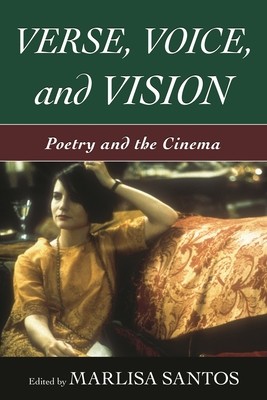
- We will send in 10–14 business days.
- Publisher: Scarecrow Press
- ISBN-10: 081089209X
- ISBN-13: 9780810892095
- Format: 15.5 x 22.9 x 2.8 cm, kieti viršeliai
- Language: English
- SAVE -10% with code: EXTRA
Verse, Voice, and Vision (e-book) (used book) | bookbook.eu
Reviews
Description
Although it is a somewhat underrepresented form of literature in popular sensibility, poetry finds relevance in the modern world through its appearance in cinema. Film adaptations of poems and depictions of poets on the screen date back to the silent era and continue to the present day. However, there have been few serious studies of how cinema has represented the world of poetic expression. In Verse, Voice, and Vision: Poetry and the Cinema, Marlisa Santos has compiled essays that explore the relationship between one of the world's oldest art forms--poetry--and one of the world's newest art forms--film. The book is divided into three sections: poets on film, poetry as film, and film as poetry. Topics include analyses of poet biopics (such as Mrs. Parker and the Vicious Circle), filmic representations of poets or poetic studies (including Pyaasa), films inspired by particular poems (such as Splendor in the Grass), and the avant-garde phenomenon of the "poem-film" (such as The Tree of Life). Poetic influences considered in this volume range from William Shakespeare to e.e. cummings, and the films discussed hail from several different countries, including the U.S., the U.K., India, China, Italy, and Argentina. Featuring a great diversity in the age, genres, and countries of origin of the films, these essays provide an in-depth look at how poetry has been interpreted on film over the years. By addressing a heretofore unexamined aspect of film studies, Verse, Voice, and Vision will appeal to fans and scholars of both literature and cinema.
EXTRA 10 % discount with code: EXTRA
The promotion ends in 23d.12:09:37
The discount code is valid when purchasing from 10 €. Discounts do not stack.
- Publisher: Scarecrow Press
- ISBN-10: 081089209X
- ISBN-13: 9780810892095
- Format: 15.5 x 22.9 x 2.8 cm, kieti viršeliai
- Language: English English
Although it is a somewhat underrepresented form of literature in popular sensibility, poetry finds relevance in the modern world through its appearance in cinema. Film adaptations of poems and depictions of poets on the screen date back to the silent era and continue to the present day. However, there have been few serious studies of how cinema has represented the world of poetic expression. In Verse, Voice, and Vision: Poetry and the Cinema, Marlisa Santos has compiled essays that explore the relationship between one of the world's oldest art forms--poetry--and one of the world's newest art forms--film. The book is divided into three sections: poets on film, poetry as film, and film as poetry. Topics include analyses of poet biopics (such as Mrs. Parker and the Vicious Circle), filmic representations of poets or poetic studies (including Pyaasa), films inspired by particular poems (such as Splendor in the Grass), and the avant-garde phenomenon of the "poem-film" (such as The Tree of Life). Poetic influences considered in this volume range from William Shakespeare to e.e. cummings, and the films discussed hail from several different countries, including the U.S., the U.K., India, China, Italy, and Argentina. Featuring a great diversity in the age, genres, and countries of origin of the films, these essays provide an in-depth look at how poetry has been interpreted on film over the years. By addressing a heretofore unexamined aspect of film studies, Verse, Voice, and Vision will appeal to fans and scholars of both literature and cinema.


Reviews